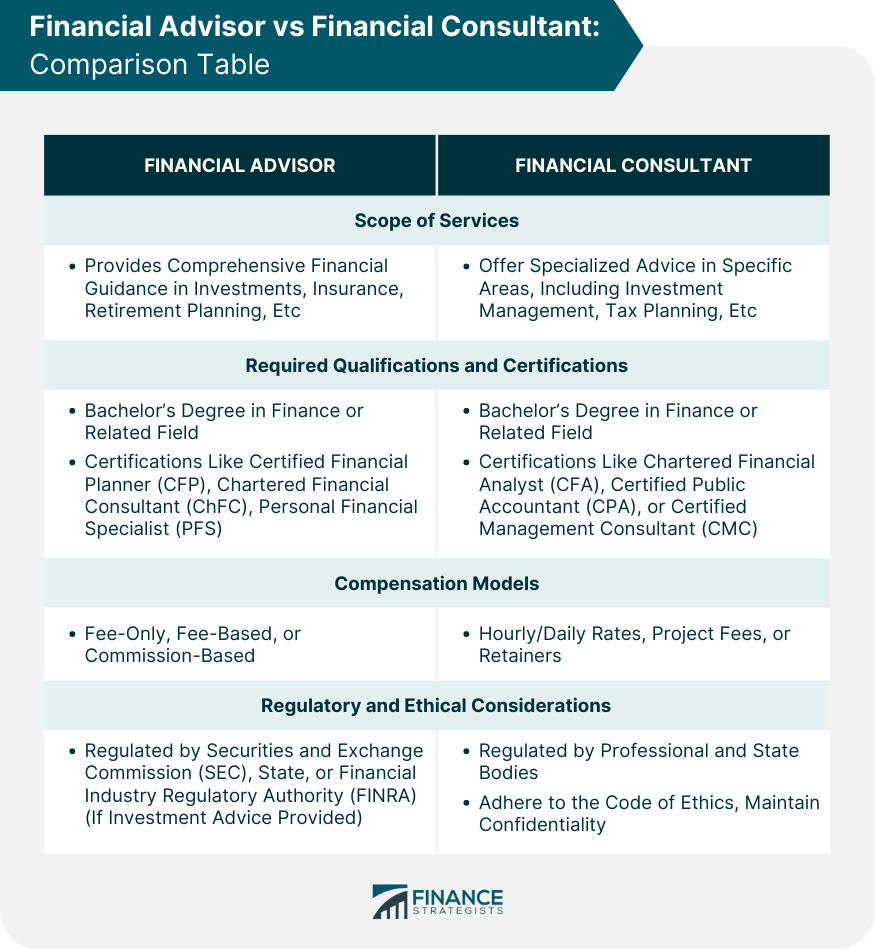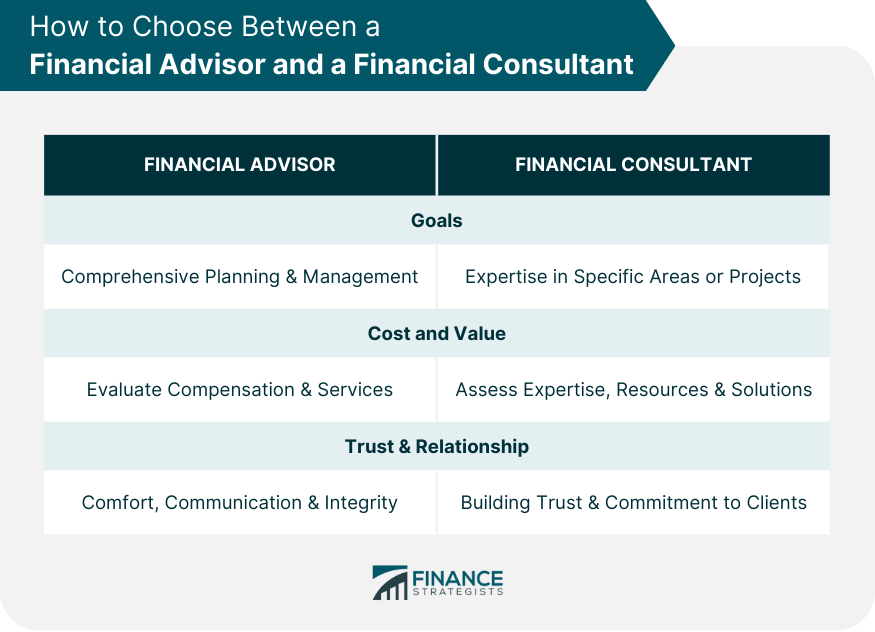A financial advisor is a broad term for a professional who helps manage your finances by providing advice on various topics such as investments, retirement planning, and taxes. They offer comprehensive financial planning services and ongoing management to guide clients toward their financial goals. On the other hand, a financial consultant, often specialized in specific areas of finance, provides expert advice and strategies to individuals or corporations to optimize their financial situation. While both professions aim to assist clients in making informed financial decisions, the main difference lies in the breadth of services provided, with financial advisors offering a more holistic approach and financial consultants focusing on particular financial issues or projects. Financial advisors are professionals who help manage your finances by providing advice on a range of topics. These can include investments, insurance, retirement planning, estate planning, tax advice, and more. Their goal is to guide clients toward their financial goals by crafting personalized financial plans. A financial advisor can help you make more informed decisions about where and how to invest your money. They can also provide insight into complicated investment strategies and options, manage your portfolio for you, or guide you through major life events like buying a home or retirement. Financial consultants, sometimes known as financial analysts or financial planners, typically focus on specific areas of finance. They provide expert advice and strategies to individuals or corporations in areas like investment management, risk management, tax planning, or retirement planning. Their main objective is to optimize their client's financial situation. They might analyze market trends and investment opportunities, offer advice on how to minimize tax liability or develop a detailed retirement plan. Financial consultants may also work with businesses to help streamline operations, reduce costs, or improve financial performance and growth. Financial advisors need to possess a series of qualifications and certifications depending on the services they provide. Generally, they hold a bachelor's degree in finance, business, economics, or a related field. Many have further qualifications like the Certified Financial Planner (CFP), Chartered Financial Consultant (ChFC), or Personal Financial Specialist (PFS) certifications. Some financial advisors who deal with investments also need licenses from regulatory bodies, such as the Series 65 or Series 7 licenses in the U.S., and they may also be registered with the Securities and Exchange Commission (SEC) or state regulators. Financial consultants typically hold a bachelor's degree in finance, economics, business administration, or a related field. They might also possess an MBA or a master's degree in finance. Professional certifications such as the Chartered Financial Analyst (CFA), Certified Public Accountant (CPA), or Certified Management Consultant (CMC) are common and can enhance credibility. Financial consultants may also need to be licensed or registered with regulatory bodies, especially if they offer investment advice or manage portfolios. Financial advisors are compensated in several ways. Some operate on a fee-only model, where they charge a flat fee, an hourly rate, or a percentage of assets under management. Others may be fee-based, combining fees with commissions from selling financial products. Finally, some advisors work solely on commissions, earning money when they sell specific products or carry out certain transactions. Financial consultants usually charge an hourly or daily rate, or they may charge a fee based on the project. Some may also operate on a retainer basis, where clients pay a set fee for ongoing services. If they're offering investment advice or managing portfolios, they might also charge a percentage of the assets under management. It's important to note that consultants do not typically earn commissions from selling financial products. Financial advisors are subject to regulation by various bodies. Those who deal with investments are regulated by the SEC or state regulators and may be subject to rules from self-regulatory organizations like the Financial Industry Regulatory Authority (FINRA). They must adhere to the standards and ethics of their profession, including acting in the best interests of their clients, providing transparent and clear communication, and maintaining confidentiality. Financial consultants are also regulated by professional and state bodies. They are bound by a code of ethics that includes maintaining client confidentiality, providing unbiased advice, and avoiding conflicts of interest. Some professional organizations, like the Institute of Management Consultants USA, also provide a Code of Ethics for their members. When deciding whether to work with a financial advisor or a financial consultant, consider your financial objectives and the level of financial guidance and services you require. If you need comprehensive financial planning and ongoing management, a financial advisor may be the better choice. If you need expertise in a specific area of finance or require advice for a particular project or short-term goal, a financial consultant might be the more suitable option. Cost and value are other crucial considerations. You should understand how a professional is compensated and ensure it aligns with your comfort level and budget. It’s also vital to assess the value you're receiving for that cost. Do they have the expertise, experience, and resources to meet your needs? Are they providing personalized advice and solutions tailored to your situation? The relationship between a client and a financial professional is built on trust. It's important to feel comfortable with the person managing your money. Consider their communication style, transparency, integrity, and commitment to putting your interests first. Regularly evaluating these factors can help ensure a positive, productive relationship. The primary distinction between a financial advisor and a financial consultant lies in the scope of services they offer and their area of focus. Financial advisors provide comprehensive, ongoing management and financial planning services to guide clients toward their financial objectives. Conversely, financial consultants, with their specialized focus, offer tailored strategies and advice for specific financial areas or projects. Both roles necessitate a strong educational background and often require specific certifications, and their compensation models differ significantly. Choosing between the two comes down to your personal financial goals, the cost, the value provided, and the level of trust in the relationship. Regulatory and ethical considerations ensure both adhere to professional standards and act in the best interests of their clients. Understanding these nuances is vital in making an informed choice for your financial guidance needs.Financial Advisor vs Financial Consultant Overview
Direct Comparison of Financial Advisors vs Financial Consultants
Scope of Services Provided
Financial Advisors
Financial Consultants
Required Qualifications and Certifications
Financial Advisors
Financial Consultants
Compensation Models
Financial Advisors
Financial Consultants
Regulatory and Ethical Considerations
Financial Advisors
Financial Consultants

How to Choose Between a Financial Advisor and a Financial Consultant
Understanding Personal Financial Goals
Considering the Cost and Value
Importance of Trust and Relationship Building

Final Thoughts
Financial Advisor vs Financial Consultant FAQs
The primary difference lies in the scope of services provided. Financial advisors typically offer comprehensive financial planning services and ongoing management, while financial consultants often specialize in specific areas of finance and may offer advice for a particular project or short-term goal.
Both financial advisors and consultants usually hold a bachelor's degree in finance, business, economics, or a related field. Many have further qualifications like the Certified Financial Planner (CFP), Chartered Financial Consultant (ChFC), Personal Financial Specialist (PFS), or Chartered Financial Analyst (CFA). It's also common for these professionals to be registered with regulatory bodies.
Financial advisors may be compensated through a fee-only model, fee-based model, or by commissions. Financial consultants typically charge an hourly or daily rate, a project-based fee, or a retainer for ongoing services. Some may also charge a percentage of assets under management if they offer investment services.
Consider your financial goals and the level of financial guidance you need. If you require comprehensive financial planning and management, a financial advisor might be better suited to you. If you need expert advice in a specific financial area or for a short-term project, a financial consultant could be more appropriate.
Both financial advisors and consultants are regulated by professional and state bodies. They are expected to adhere to a code of ethics that includes maintaining client confidentiality, providing unbiased advice, and avoiding conflicts of interest.
True Tamplin is a published author, public speaker, CEO of UpDigital, and founder of Finance Strategists.
True is a Certified Educator in Personal Finance (CEPF®), author of The Handy Financial Ratios Guide, a member of the Society for Advancing Business Editing and Writing, contributes to his financial education site, Finance Strategists, and has spoken to various financial communities such as the CFA Institute, as well as university students like his Alma mater, Biola University, where he received a bachelor of science in business and data analytics.
To learn more about True, visit his personal website or view his author profiles on Amazon, Nasdaq and Forbes.











